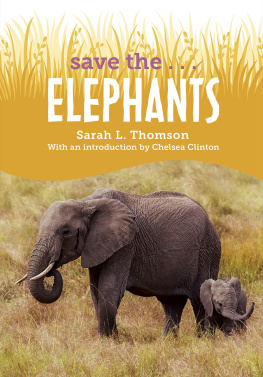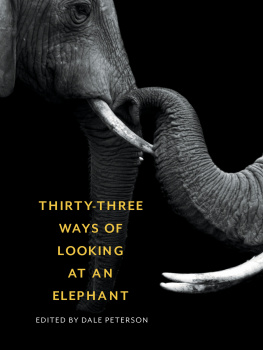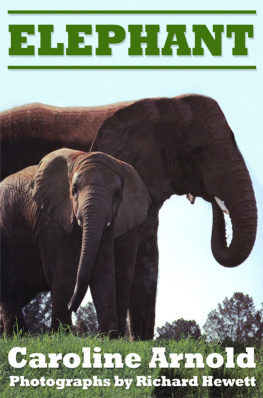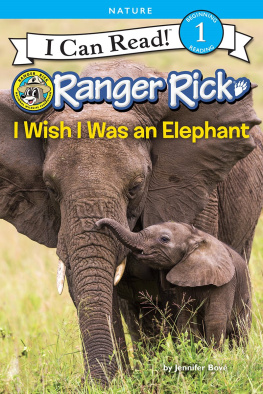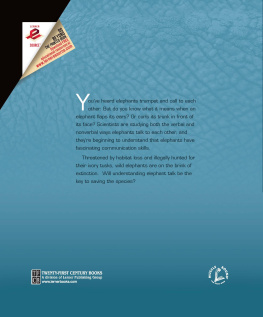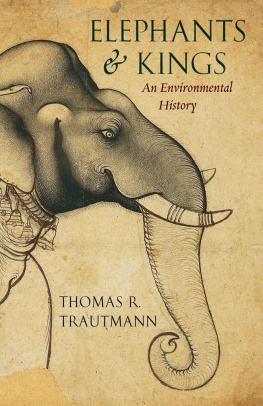More praise for Elephants on the Edge:
This book ... is fascinating ... [and] sheds light on disturbing phenomena relevant to the future not only of elephants but also of humans subjected to similar disruption. Read it.
Robert M. May, Professor Lord May of Oxford OM AC KT FRS
Groundbreaking and [a] remarkable feat of scholarship.... This fascinating book [shows] that we cannot understand the ... relationship between man and other co-inhabitants of the natural world without insights into the deeper psychological and ethical substrata of our own minds.
Allan Schore, Department of Psychiatry and Biobehavioral Sciences, David Geffen School of Medicine, University of California at Los Angeles
Revolutionary and very exciting, [Elephants on the Edge] is important in terms of both elephant biology and elephant welfare.
Cynthia Moss, Amboseli Trust for Elephants
Elephants on the Edge is a wide-ranging, passionate, well-researched, and urgent call to action. These magnificent, intelligent, and emotional giants are quintessential poster animals for the wounded world in which we live. Read this book, share it widely, and please do something to increase our compassion footprint before its too late. Healing demands collective cross-cultural action now.
Marc Bekoff, University of Colorado, coauthor with Jessica Pierce of Wild Justice: The Moral Lives of Animals
A poignant presentation of the eradication of elephant societies.... The arguments transcend the subject matter of elephants and herald a new cultural stance on human-animal relationships.
Lori Marino, Emory University
In Elephants on the Edge, G. A. Bradshaw helps us face our ethically flawed relationship with animals and nature and what is at stake for all of us.
John P. Gluck, University of New Mexico; Kennedy Institute of Ethics, Georgetown University

Elephants on the Edge
What Animals Teach Us About Humanity
G. A. Bradshaw

Frontispiece and chapter-opening photographs courtesy of Cyril Christo and Marie Wilkinson.
Published with assistance from the foundation established in memory of Philip Hamilton McMillan of the Class of 1894, Yale College.
Foreword copyright 2009 by Calvin Luther Martin.
Copyright 2009 by G. A. Bradshaw. All rights reserved. This book may not be reproduced, in whole or in part, including illustrations, in any form (beyond that copying permitted by Sections 107 and 108 of the U.S. Copyright Law and except by reviewers for the public press), without written permission from the publishers.
Designed by Nancy Ovedovitz and set in type by Technologies N Typography. Printed in the United States of America by Sheridan Books.
Library of Congress Cataloging-in-Publication Data
Bradshaw, G. A. (Gay A.), 1959
Elephants on the edge : what animals teach us about humanity / G. A. Bradshaw.
p. cm.
Includes bibliographical references and index.
ISBN 978-0-300-12731-7 (cloth : alk. paper) 1. Elephants Behavior. 2. ElephantsPsychology. 3. ElephantsEffects of human beings on. 4. Social behavior in animals. 5. Captive wild animals. 6. Psychology, Comparative. I. Title.
QL737.P98B73 2009
599.67'15dc22 2009014004
A catalogue record for this book is available from the British Library.
This paper meets the requirements of ANSI/NISO Z39.48-1992 (Permanence of Paper).
10 9 8 7 6 5 4 3 2 1
To Fritzi
One does not meet oneself until
one catches the reflection from an eye
other than human.
Loren Eiseley
Foreword
Elephant breakdown, the subject herein, disturbs me. It says my own was inevitable. Recall Nietzsches crackup, triggered by the sight of a tradesman flogging a horse, and you begin to understand what Im talking about.
We are all susceptible. Descartes in dressing gown before his hearth, demolishing, as if brick by brick, his rational mindone of the more famous crackups of history. The cloak of composure we wear carries its own unravelingthe bit of thread lying exposed. Sometimes, as with Nietzsche, it happens in a thunderclap of shattering dissonance.
Whether swift or slow, this is how we grow. By being defeated, decisively, / by constantly greater beings.
Thoreaus crackup occurred on a camping trip in the Maine wilderness. Alone in the swirling mists at Katahdins summit, he felt a great energy moving near him. What is this Titan that has possession of me? Contact! Contact! he shouts into the pages of his journal. Who are we? Where are we? The sober author of Walden was in a place not controlled by manuntouchable, impenetrable, and impalpable. The mountain awakened with a force not bound to be kind to man, Thoreau noted chillingly.
So did the untouchable, impenetrable, impalpable Uncertainty that wrestled with Jesus of Nazareth for forty days and nights (that kneaded him as if to change his shape). Forty days in the presence of something language cannot reachyet reborn, in the end, into the Jesus of History.
Carl Jung, in search of the primal mind on a trip through equatorial Africa, found himself perilously close to the same experience. The trip revealed itself as less an investigation of primitive psychology ... than a probing into the rather embarrassing question: What is going to happen to Jung the psychologist in the wilds of Africa?
The primitive, Jung realized, was a danger to me.
So it is to all of us, Dr. Jung. A scientific investigation into primitive psychology backfired into an explosive encounter with the First World of totemic consciousnesswhere consciousness is no longer exclusively human. In this eerie commonwealth of symmetrical, mirrored minds, the psychologist risked becoming something changed.
Like Thoreau atop Katahdin, Jung found himself poised to know as he was known.
The phrase is St. Pauls, and it is a bombshell. It marks the watershed separating where the wild things are from where the domesticated things are.
The First World bubbles just beneath the surface in each of us. C. G. Jung would agree. Jung would also agree that as children we are born into this chthonic consciousness (ontogeny recapitulates phylogeny), and, he would add, we ignore this deep, wild-visaged consciousness at the peril of our sanity. Whenever we give up, leave behind, and forget too much, there is always the danger that the things we have neglected will return with added force.
Elephant consciousnesshuman consciousness. Two sides of the same coin, says Bradshaw. Ever since Adams Wall (beast on one side, mankind on the other), we have struggled mightily to suppress this cosmic law. (Daniel Quinn calls it The Great Forgetting.) Until, like Nietzsche, we snap.
It is worth remembering that long before the Middle Eastern invention of sky gods, our ancestors followed labyrinthine chambers down into the entrails of the earth to stencil their hands on smoky walls reaching across a membrane of stone to touch and be quickened by the spirit of animal kinsmen. Chauvet, Cosquer, Gargas, Pech-Merle,
Cougnac. Subterranean halls whose walls rippled with bison, horses, oxen, lions. On the other side of the equator herds of eland, kudu, and springbok thunder by on open-air boulders in Namibia and Botswana. In Australias Arnhem Land marsupial and man dream the same dream.
Ever since Lucy the Australopithecine, mankind has known that the coin of consciousness bearsmust beartwo sides. Otherwise there is no viable or sane currency on earth. Except for Adams heirs.
Next page

